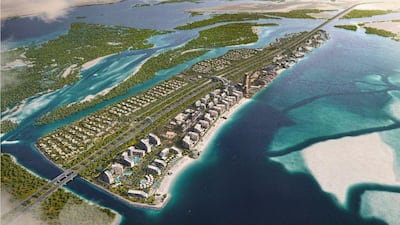The surge in Abu Dhabi’s population shows it is a global contender as a destination when people are deciding to move for life or work, experts have told The National.
It will mean even more demand for the emirate’s rising property sector, increase opportunities for extra public transport and underline its status as a haven.
And as Abu Dhabi has invested considerably in bringing world-class schools and universities to the emirate, the focus could now shift to vocational and trade schools along with affordable schools and colleges.
The National on Tuesday spoke to experts in several fields to assess the effect of the population crossing the four million mark for the first time, as revealed by data from the Statistics Centre in Abu Dhabi.
Abu Dhabi City and the immediate surrounding area represents 2,823,340 of the 4,135,985 total and it marks a remarkable transformation for a capital that was just a stone fort and barasti huts a few decades ago.
It follows sustained efforts over the past few years by authorities to attract more people with efforts such as liberalised visa rules, new residential, cultural and leisure developments and investment in education along with major efforts to make the city more liveable with cycle lanes and parks along with already high safety levels and tax-free salaries.

Property boom
Mario Volpi, head of brokerage at Novvi Properties, said “any increase is excellent news for the housing market”.
The market is already surging in Abu Dhabi. For example, Aldar Properties generated more than Dh3.5 billion ($953 million) in sales from Fahid Beach Residences and The Beach House, the island’s first residential developments released last month.
Mr Volpi said many companies no longer offer accommodation or housing allowances as Abu Dhabi and Dubai are not seen as hardship postings any more because people are “flocking here” and there is no need to entice them.
He pointed to the fact many rent here and then save to buy an investment property.
“That is a trend,” he said. “Population fuels all of that and, in addition to global investors, people still see the UAE as a safe haven to invest despite all that has happened recently,” he said.
Mr Volpi said the emirate has not been shouting from the rooftops but quietly getting on with work. “The population increase will make people stand up and look at Abu Dhabi as a real contender for people to move to, live and work.”
Educating new residents
Some of Abu Dhabi’s schools are among the best in the world, while its universities continue to soar in international rankings. The UAE's Khalifa University of Science and Technology rose 25 places to 177th globally in the QS World University Rankings 2026 that were published last month.
New school projects have also been announced such as King's College School Wimbledon at Fahid Island in 2028. The renowned Harrow School is also set to launch campuses in both Abu Dhabi and Dubai under a partnership with UAE education provider Taaleem.
Dr Senthil Nathan, managing director and co-founder of the Edu Alliance consultancy, said as the population surges, the diversity of learners, learning needs, training needs and career aptitudes will also increase.
“Abu Dhabi emirate has invested considerably in bringing in world-class K-12 [primary and secondary] institutions and universities to the emirate in the past two decades,” he said. “Now the focus may need to be on encouraging other types of educational institutions (access institutions, vocational/trade schools, special needs and affordable schools and colleges.”
At least 54.7 per cent of gross domestic product in Abu Dhabi comes from the non-oil sector, statistics show and Dr Nathan said as diversification from oil continues, it is important to “promote and invite” specialised institutions that cater to graduating skilled professionals for thriving sectors in hospitality, tourism, real estate, health care, eSports and more.
He also said affordable schools could be developed through public private partnerships and this model could also be applied to help provide education support from those who are at an advanced level to people who need more support.
“Such support [PPP] is essential to attract a world-class talent pool to develop Abu Dhabi into an emerging technology centre of the world.”
Transporting rising population
Residents of Abu Dhabi are eagerly awaiting the launch of the Etihad Rail passenger service, due to start in 2026.
The precise location of all stations has yet to be revealed by the operator but it said it plans to link them with existing transport networks.
A high-speed link to Dubai has also been announced but a launch date has not been revealed. Transport bosses have also made huge improvements to public transport such as bolstering the bus network, introduced tram-like electric buses and testing air taxis.
“As Abu Dhabi surpasses four million residents, the city will need to focus on augmenting its connected, seamless and sustainable transport ecosystem for local residents and workers,” said Martin Tillman, transport expert and founder of TMP Consult.
“From the planned introduction of passenger services on Etihad Rail to new mobility modes like … autonomous taxis and the current trials of automated rapid transit [tram-like buses], Abu Dhabi has a unique opportunity to grow sustainable and innovative transit services that provide connectivity for moving large amounts of people around the city with less reliance on private cars.”
The statistics show that 54 per cent of residents are aged 25 to 44, an age group that tends to travel more, noted Paulo Anciaes, principal researcher in transport and health at University College London. This in turn contributes to the pressure on the existing transport systems, he said.
"But on the positive side, the 25 to 44 age group may be more receptive to public transport than older age groups," he added. "The growth in population also requires a growth in the supply of housing.
"There is a risk that this could lead to more urban sprawl and new low-density residential developments. This will bring additional challenges to transport, especially to public transport, as travel distances will grow."
Mr Tillman said initiatives such as “transit-orientated development” – ensuring people, buildings and public spaces are brought together – and “mobility as a service” – combining services such as trains, buses, e-scooters, car sharing in one platform or app – were important.
He highlighted Reem Island and Al Maryah Island as examples of transit-orientated developments while Etihad Rail has said its platform would integrate tickets, journey planning and more.
“Alignment between land use, housing and mobility policy is important,” he said. “So that public transport and active modes such as walking and cycling become the default in this world-class liveable city.”



